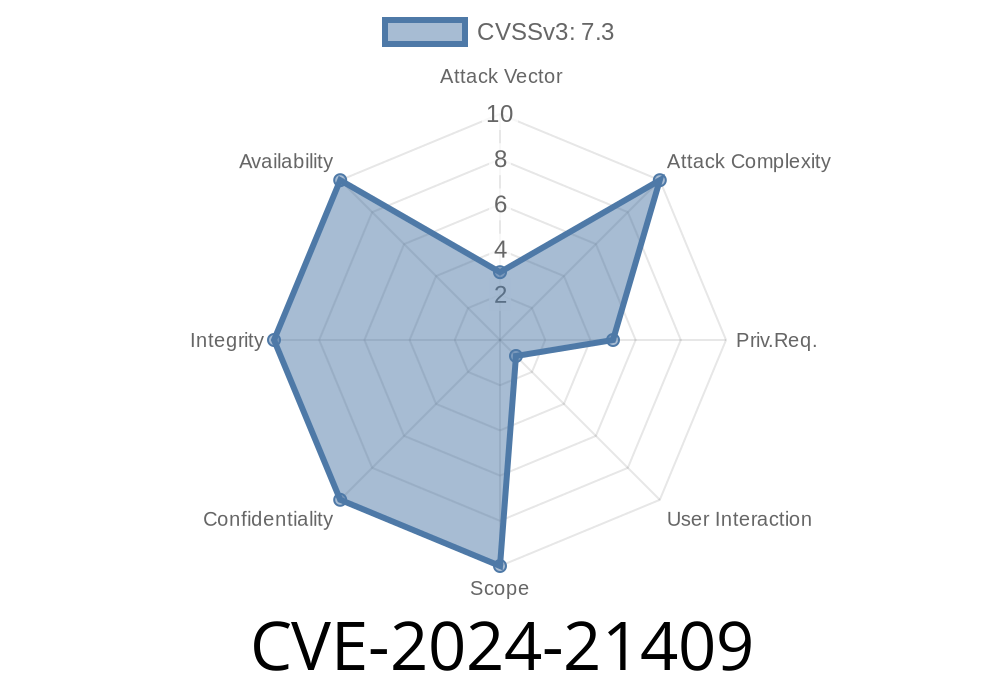In February 2024, Microsoft acknowledged a critical security flaw—CVE-2024-21409—affecting .NET, .NET Framework, and Visual Studio. This remote code execution (RCE) bug can allow attackers to run arbitrary code in the context of the user running the vulnerable application. Even worse, it can be triggered by simply opening a special file, with no explicit user interaction, especially in development environments.
In this long read, I'll break down how this vulnerability works in simple terms, provide example code that illustrates the underlying flaw, discuss real-world exploit scenarios, and point you to key resources for mitigation and further reading.
What Is CVE-2024-21409?
This vulnerability lies in the way certain components in .NET and Visual Studio handle specific project or configuration files. Malicious actors can craft a special file which, when loaded or opened in Visual Studio or a .NET-based application, leads to the execution of attacker-supplied commands with the current user's privileges.
More details from Microsoft's official write-up
> Microsoft Security Update Guide - CVE-2024-21409
Technical Breakdown
At the heart of the vulnerability is the way MSBuild (the Microsoft Build Engine) processes project files (e.g., .csproj, .vbproj, .fsproj). These files are XML documents, but they can contain Target and Task elements that, under certain conditions, will run code or commands during project loading or building.
The malicious task executes, running code on the victim's machine.
In some cases, Visual Studio's preview pane can trigger code execution just by previewing the file!
Here’s a streamlined example of a poisoned .csproj file that abuses the vulnerability
<Project Sdk="Microsoft.NET.Sdk">
<PropertyGroup>
<TargetFramework>net8.</TargetFramework>
</PropertyGroup>
<Target Name="MaliciousAction" AfterTargets="Build">
<Exec Command="powershell -exec bypass -c 'Start-Process calc.exe'" />
</Target>
</Project>
In this snippet, during or after build, the Exec task launches calc.exe (Calculator) as a simple demonstration. Swap out calc.exe with any payload for real exploitation.
Exploit Flow
1. Attacker crafts a malicious project file and uploads it to a public GitHub/GitLab repo or shares it via email.
Result: The attacker achieves code execution on the developer's workstation.
Note: It's possible to hide these tasks where a quick manual scan might not find them, and attackers can further obfuscate their payloads.
Real-World Attack Scenarios
- Open Source Supply Chain Attacks: Imagine a pull request to a busy project, sneaking in a malicious .csproj or .props file update. A maintainer or CI system opens or builds it, triggering the exploit.
- Targeted Phishing: Sending developers a seemingly legit sample project with weaponized build tasks.
Avoid opening untrusted project files or build scripts from unknown sources.
> Patch links:
> - .NET February 2024 Security Updates
> - Visual Studio Security Updates
Code Review: Search project files for <Task>, <Exec>, or custom <Target> elements.
- Endpoint Detection: Monitor for suspicious child processes (e.g., dotnet.exe or MSBuild.exe spawning cmd.exe, powershell.exe, etc.).
- Policies: Disable automatic build on project open in Visual Studio (Tools → Options → Projects and Solutions → uncheck "Build and Run on project open").
- Static Analysis: Use tools like SonarQube or custom scripts to scan for suspect MSBuild constructs.
More Resources
- Microsoft Security Portal: CVE-2024-21409
- .NET Security Updates and Advisories
- Visual Studio Security Guidance
Conclusion
CVE-2024-21409 is a clear reminder that project and configuration files are code too—and treating them as static text can be a costly mistake. Never open project files from untrusted sources, always keep your dev tools up to date, and periodically review your codebase for sneaky build tasks.
If you manage a .NET shop, take this as a chance to review your security posture. It’s much easier to patch and prevent than clean up after a compromise.
Timeline
Published on: 04/09/2024 17:15:34 UTC
Last modified on: 04/10/2024 13:24:00 UTC
